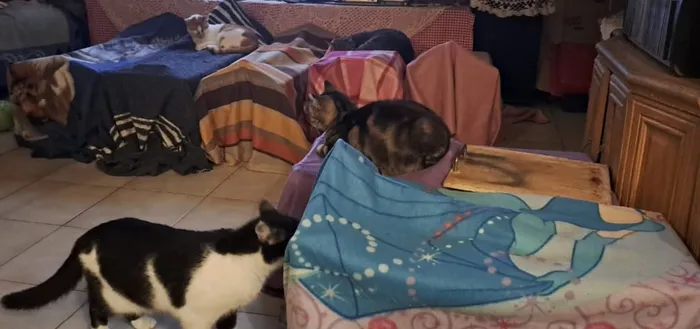Cat trappers to the rescue

Two Durban cat trappers risk their lives, use their own money and time to capture feral cats, have them sterilised and return them to their colonies to manage the feline populations.
Two Durban cat trappers risk their lives, use their own money and time to capture feral cats, have them sterilised and return them to their colonies to manage the feline populations.
Bridget Slogrove, a cat trapper for the Queensburgh and surrounding areas, has been rescuing cats for more than 10 years.
“A cat has an average of 4 kittens per pregnancy and kittens can fall pregnant from about 4 or 5 months old. Cats go on heat every 2 to 3 weeks, so the female can have up to 4 litters of kittens in a year. The sum of all these babies and their babies multiplying is scary.
“Trappers take the females (and males) for sterilisation at the feeder’s expense or by fundraising to stop them from breeding out of control. We trap, have them sterilised by vets and then return them to where they were trapped. You cannot take a cat and release it anywhere ‒ they know their surroundings where they were trapped.”
Cat trappers can work independently from animal organisations, which is what Slogrove has been doing since the organisation she worked for closed down. She uses her own funds to help the cats.
“Cat trappers will receive a call from any organisations for help with trapping in a certain area or from a feeder and they will assist in trapping the cat.
“We then make arrangements for the cats not to be fed beforehand and we go out and set up our traps using bait. I use pilchards in tomato sauce because cats love this. Some traps are automatic. Others have a string attached and you have to wait until the cat is right in the back of the trap and intent on eating before pulling the string.”
She said that once caught, they were sterilised and marked before being released back into their colonies.
“The cats from a sterilised or controlled colony will all have one ear clipped at the top or a V cut into the top of the ear. This is how we know they have been treated.
“Between my friend and I, we trapped more than 300 cats in 10 months and sterilised them at our own cost.”
Slogrove is concerned about an increase in people trapping cats illegally and sending them to animal shelters instead of allowing them to remain in their colonies.
Doing this decreases the chance of these cats because, while shelters do a good job of finding homes for tame cats and kittens. feral cats can take years to tame and sometimes will never settle.
Slogrove said she wanted to educate people the public on the proper procedures when it comes to feral cats.
From oThongathi and Stanger in the north to eManzimtoti in the south and Chatsworth and Pinetown in the west, there are about 27 trappers who can assist with hiring traps and guiding people on how to trap, she said.
They will help to get them sterilised at welfare rates for pensioners, the unemployed and people living on grants. Trappers welcome donations to contribute to the transport and post surgery care.
Barbara Wilhelm, 67, is another passionate cat trapper who covers areas from Pinetown to Westville.
Wilhelm has been cat trapping for 9 years, starting with helping feed feral cats.
“Cat trappers are very important: when you are desperate for help, we will be there to help free of charge.”
Wilhelm fears there are not enough cat trappers left to help.
“Even though we have a few, it’s not what it used to be. There aren’t many young trappers to take over from us, especially since we face monetary constraints by not having people pay us. We are rarely paid.
“Cat trapping is more than just time; it costs money to take care of and sterilise or neuter them but we do it because we care about them.”
She said she had trapped more than 1000 cats and assisted pensioners and low income earners to have their cats sterilised at vets which participate in their mission.
“I am passionate about the cats. We love them and want only the best for them. Helping one colony is better than not helping any. I know I can’t save every cat but I can at least help some. As long as they are safe, I am happy to give all my time and energy to them.
“Some pet owners abandon their cats or just throw them out if they are pregnant or have kittens. It is horrific what these creatures have to endure,” said Wilhelm.
If you wish to donate to the cause, contact Bridget Slogrove on 083 270 0238.
Related Topics: